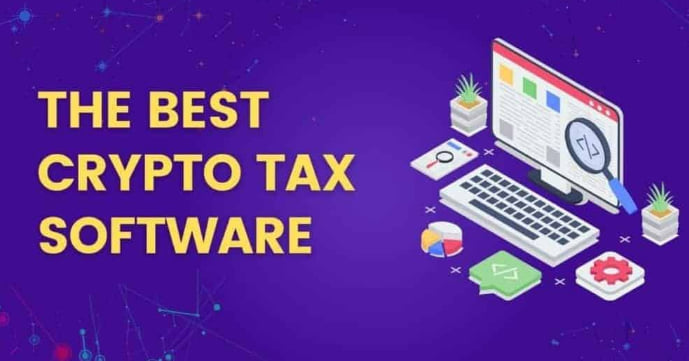Cryptocurrencies like Bitcoin and Ethereum have exploded in popularity in recent years. With more people investing in digital assets, properly reporting crypto activity on your taxes has become increasingly important. Fail to report your crypto taxes properly and you could face penalties, interest, and audits from tax authorities.
That’s where crypto tax software comes in. These tools help cryptocurrency investors and traders calculate capital gains, losses, and income from crypto in order to fill out tax forms accurately. As crypto tax reporting gets more complex, tax prep software has become a necessity for many crypto users.

Why Crypto Taxes Are Challenging
Cryptocurrency taxes present some unique challenges that make reporting difficult:
- Frequent trading – Active crypto traders can have hundreds if not thousands of transactions per year across multiple exchanges and wallets. This high volume makes tax prep extremely tedious.
- Multiple taxable events – Crypto tax liability arises from more than just selling crypto for fiat. Other taxable events include trading one crypto for another, earning crypto from mining or staking, receiving airdrops, spending crypto, and more.
- No issuance of tax forms – You won’t get any 1099 or other tax forms from crypto exchanges. The responsibility falls entirely on the taxpayer to track and calculate crypto gains and losses.
- Matching buys to sells – To determine capital gains and losses, you need to match the cost basis of crypto when acquired to the proceeds received when selling or spending it. With frequent trading across multiple wallets, this matching becomes highly complex.
- Multi-year reports – Crypto holdings and activities often span multiple tax years which requires tracking crypto taxes across years.
- Evolving regulations – Cryptocurrency tax rules are still being defined by regulatory agencies like the IRS and HMRC. You need to stay updated on the latest crypto tax guidance.
These numerous challenges make manual crypto tax preparation impractical and risky for many crypto users. Let’s look at how crypto tax software helps address these issues.
Key Benefits of Crypto Tax Software

Crypto tax calculators automate much of the tedious tax prep work for you and provide essential features that eliminate common pain points:
1. Importing Transactions
The first key step is getting all your crypto transactions into the tax software. Leading tools can connect directly to exchanges through API or CSV files to import your full trading history. Some may also allow importing data from blockchain explorers for on-chain activity.
This saves you from having to manually log hundreds of trades or copy-paste exchange reports. Importing transactions provides the raw data needed for tax calculations.
2. Matching Cost Basis
With all transactions in one place, the software can then match buys and sells of cryptocurrencies. This establishes the cost basis for each disposal event like a sale or spend.
Accurately matching cost basis across wallets and exchanges is essential for calculating capital gains and losses correctly. Doing this manually for frequent traders would be near impossible.
3. Generating Tax Reports
Once transactions are imported and matched, the crypto tax software computes capital gains, losses, and income. It then populates these amounts in the required IRS forms like Form 8949 for capital gains/losses and Schedule 1 for additional income.
Some software may support tax forms for other countries as well beyond the U.S. The end result is a set of completed tax documents containing your crypto activity that can be filed with your returns.
4. Interactive Tools
Leading tax calculators include useful tools to review and edit transactions. For example, you can manually tag or change matched buys/sells, identify staking income or other taxable events, mark wash sales, and more.
Having interactive tools to verify and adjust data gives you more control over the tax preparation process. You can ensure the tax reports accurately reflect your specific crypto activity.
5. Audit Support
Reputable crypto tax software can serve as an audit defense file containing your full digital asset activity history across wallets and exchanges.
Having detailed documentation of your crypto transactions gives you evidence to substantiate your tax returns if questioned by tax authorities.
Top Crypto Tax Software
Now that we’ve seen the key benefits, here are some of the top crypto tax solutions:
- CoinTracker – Supports over 300 exchanges and wallets. Full tax reports compliant with the IRS, HMRC, CRA, and ATO. Free tax loss harvesting tools.
- CryptoTrader.Tax – Integrates with all major exchanges. Dedicated tax professionals available for support. Tax loss harvesting and automated reporting.
- TokenTax – Specializes in crypto taxes with unlimited transactions and full audit support. Live CPA chat and guaranteed maximum refund.
- Koinly – Generates 8949, Schedule 1, FBAR, and other tax forms. Allows disputing and amending matched transactions.
- CoinLedger – Tax reporting across 1500+ coins. Tools for managing staking, mining, DeFi activities, and NFTs.
I evaluated tax software based on supported integrations, accuracy of tax calculations, usability of tools, audit defenses, and customer support. Make sure to assess crypto tax solutions against your specific needs like number of transactions, data sources, and types of crypto activities.
When to Use Crypto Tax Software

Here are some scenarios where crypto tax software becomes essential:
- You have high trading volume across many exchanges – Manually preparing taxes on hundreds of trades is unrealistic. Tax software is necessary to import and calculate capital gains at scale.
- You need to match cost basis from multiple wallets and platforms – Determining cost basis yourself with frequent transfers between wallets and exchanges is incredibly complex. Automated matching saves massive effort.
- You trade multiple cryptocurrencies like Bitcoin, Ethereum, stablecoins, altcoins, etc – With trades across so many crypto assets, there’s high likelihood of miscalculating gains and losses when doing it manually.
- You want to maximize tax savings through tax loss harvesting – Software provides loss reporting tools that let you efficiently identify and realize crypto losses to offset capital gains and reduce taxable income.
- You have crypto income beyond just trading like staking, mining, airdrops, or payments – More complex crypto activities create additional reportable income. Software identifies and calculates these various income sources.
- You need to file multi-year reports on crypto holdings – Keeping accurate records across tax years is extremely difficult manually but can be managed through crypto tax platforms.
- You want audit support if questioned by tax authorities – Crypto tax tools give you detailed documentation of your digital asset activity to validate your tax returns.
Conclusion
Cryptocurrency market is expanding so fast. Traders also use DCA with automation tools, different bot services to make high profit. As crypto tax rules continue to evolve, manual crypto tax preparation becomes overly complex and risky. Crypto tax calculators automate the collection of transaction data, matching of buys/sells, computation of capital gains/losses and income, and generation of required tax forms. Their various tools support the entire tax reporting process end-to-end.
For active crypto traders and investors, crypto tax software has become an essential tool to stay compliant, maximize deductions, and avoid costly penalties from incorrect reporting. As digital asset adoption increases, expect trusted tax platforms to play a critical role in proper crypto tax filing.
FAQs
What are the benefits of using crypto tax software?
The main benefits are automating data import and collection, accurately matching cost basis, calculating capital gains/losses across trades, generating required tax forms, providing audit support, and giving users tools to review and adjust transactions. This saves significant time and ensures correct tax reporting.
What features should I look for in crypto tax software?
Look for tools that connect to all your exchanges and wallets to import transactions, match buys/sells accurately, support your specific crypto activities like staking/mining/NFTs, provide customizable reports, and offer options to edit data or harvest tax losses.
When do I need to start using crypto tax reporting software?
You should start using crypto tax software as soon as you begin actively trading or investing in cryptocurrencies. Even just a few trades across exchanges can get complex for tax prep. It’s best to use tax calculators from the start rather than manual tracking.
Can I import CSV files from exchanges into crypto tax platforms?
Yes, most crypto tax software allows importing CSV files containing your transaction history that you can export from exchanges. Uploading these CSVs will input all your trades into the tax calculator. Some may also support API connections.
How do crypto tax tools match buys with sells to determine cost basis?
They use accounting methods like FIFO (first-in-first-out) and LIFO (last-in-first-out) to match your earliest/latest buys to sells. You can usually pick the accounting method or even match buys/sells manually. Matching determines cost basis which is needed to calculate capital gains/losses.
What are some popular crypto tax software companies?
Some top crypto tax solutions are CoinTracker, CryptoTrader.Tax, TokenTax, Koinly, CoinLedger, CoinTracking, and Bear.Tax. Compare costs, features, integrations, and reporting accuracy to pick the right one for your needs.
Disclosure: The articles, guides and reviews on BlowSEO covering topics like SEO, digital marketing, technology, business, finance, streaming sites, travel and more are created by experienced professionals, marketers, developers and finance experts. Our goal is to provide helpful, in-depth, and well-researched content to our readers. You can learn more about our writers and the process we follow to create quality content by visiting our About Us and Content Creation Methodology pages.
